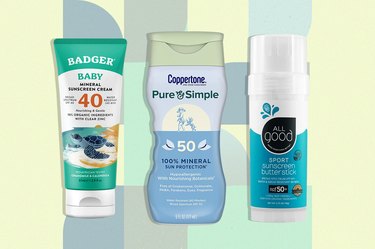
Wheat germ is more than just a nutritious addition to your diet — the ingredient and its derivatives, like wheat germ oil, can also support skin and nail health.
Wheat germ is the part of a wheat grain that helps new sprouts grow, according to the Mayo Clinic.
Video of the Day
Video of the Day
Wheat germ oil is derived from the germ, and it's packed with nutrients like healthy fat and vitamin E, per My Food Data. In fact, just 1 tablespoon of the oil contains 135 percent of your daily value of vitamin E.
And it's because of these nutrients that using wheat germ oil for hair or skin has so many potential benefits. According to the Cleveland Clinic, eating foods rich in vitamin E — like wheat germ oil — or applying topical moisturizers that contain the vitamin may help you see these results.
So without further ado, here are the benefits of wheat germ oil for your skin and hair.
Warning
It's possible that wheat germ oil can contain trace amounts of gluten, so people with celiac disease or a gluten sensitivity should avoid it, per Beyond Celiac.
Wheat Germ Oil Benefits for Skin
Here are the perks of using wheat germ oil for skin:
1. It's Moisturizing
Wheat germ oil is rich in vitamin E. And this vitamin may help prevent your skin from losing moisture, according to the Cleveland Clinic.
Indeed, a December 2019 study in the Journal of Cosmetic Dermatology found that facial skin hydration significantly improved in people who took an oral wheat extract oil supplement for three months compared to those who did not.
However, this research only surveyed 64 people, so larger studies are needed to better examine the potential hydrating effects of wheat germ oil.
Tip
Talk to your doctor before trying a wheat germ supplement (or any supplement, for that matter), as the FDA doesn't require these products to be proven safe or effective before they're sold, so there’s no guarantee that what you take is safe, contains the ingredients it says it does or produces the effects it claims.
2. It May Prevent Skin Damage and Aging
Vitamin E acts as an antioxidant, meaning it helps protect your cells from damage, according to the Cleveland Clinic. That's why your skin oil naturally contains vitamin E — it acts as a barrier.
And adding vitamin E to moisturizers — in this case, in the form of wheat germ oil — may help further protect your skin from cell damage, per the Cleveland Clinic.
In fact, the Journal of Cosmetic Dermatology study found that people who took an oral wheat extract oil supplement had a decrease in wrinkles and increase in skin radiance compared to those who did not take the oil, all of which suggests that wheat extract may have anti-aging properties.
There's also some evidence to indicate that vitamin E can decrease sun damage from UVB rays: However, more research is needed to better establish this link, per the Cleveland Clinic.
3. It May Improve Skin Texture
Wheat germ oil is also good for skin texture. According to the Journal of Cosmetic Dermatology study, people who took the wheat extract oil saw an improvement in skin roughness compared to those who did not try the supplement.
Adding vitamin E to moisturizers may also help soften your skin, per the Cleveland Clinic.
4. It May Help Heal Wounds
Another potential wheat germ benefit for skin is that the vitamin E in the oil may accelerate burn and wound healing, according to Mount Sinai.
When it comes to wheat germ specifically, an April 2020 study in Biochemical and Biophysical Research Communications found that a peptide in wheat germ had anti-inflammatory effects and also triggered collagen and blood vessel formation in injured rats, all of which were linked to faster wound healing.
However, there need to be studies testing this treatment in humans to see if it produces the same effects.
Tip
Talk to your doctor before applying wheat germ oil or other vitamin E products to a wound to make sure using wheat germ for skin is safe for you, according to Mount Sinai.
Wheat Germ Oil Benefits for Hair
Wheat germ oil benefits don't just apply to your skin — it's also great for your hair. Here are some potential wheat germ hair benefits:
1. It May Support Hair Growth
There's some evidence to suggest that wheat germ oil has benefits for hair growth.
For instance, a small, older December 2010 study of 38 people with hair loss in Tropical Life Sciences Research found that those who took vitamin E supplements experienced increased hair growth compared to those who did not take the supplement.
That said, vitamin E is an antioxidant that can help reduce oxidative stress, a type of cell damage that has been linked to hair loss, according to a January 2017 study in Dermatology Practical & Conceptual.
This may involve eating wheat germ for hair growth or applying the oil topically, so talk to your doctor about what hair growth supplement method is best and whether you should try wheat germ oil for hair loss in the first place.
2. It's Moisturizing
Like skin, using wheat germ oil for hair may help support hydration. That's because oil can protect your hair from damage, lubricate your strands and prevent breakage, according to January 2015 research in the International Journal of Trichology.
Tip
Many wheat germ oils require refrigeration, so make sure to follow the storage instructions listed on the product label.
- Journal of Cosmetic Dermatology: "Polar lipids from wheat extract oil improve skin damages induced by aging: Evidence from a randomized, placebo-controlled clinical trial in women and an ex vivo study on human skin explant"
- Cleveland Clinic: "Vitamin E for Skin: What Does It Do?"
- Biochemical and Biophysical Research Communications: "A wheat germ-derived peptide YDWPGGRN facilitates skin wound-healing processes"
- Mount Sinai: "Wounds"
- Tropical Life Sciences Research: "Effects of Tocotrienol Supplementation on Hair Growth in Human Volunteers"
- Dermatology Practical & Conceptual: "Diet and hair loss: effects of nutrient deficiency and supplement use"
- International Journal of Trichology: "Hair Cosmetics: An Overview"
- Mayo Clinic: "Slide show: 10 great health foods"
- My Food Data: "Wheat Germ Oil"
- Beyond Celiac: "Hydrogenated Vegetable Oil/Protein and Wheat Germ Oil: Gluten-Free or Not?"
- U.S. Food and Drug Administration: “FDA 101: Dietary Supplements”
Is this an emergency? If you are experiencing serious medical symptoms, please see the National Library of Medicine’s list of signs you need emergency medical attention or call 911.

